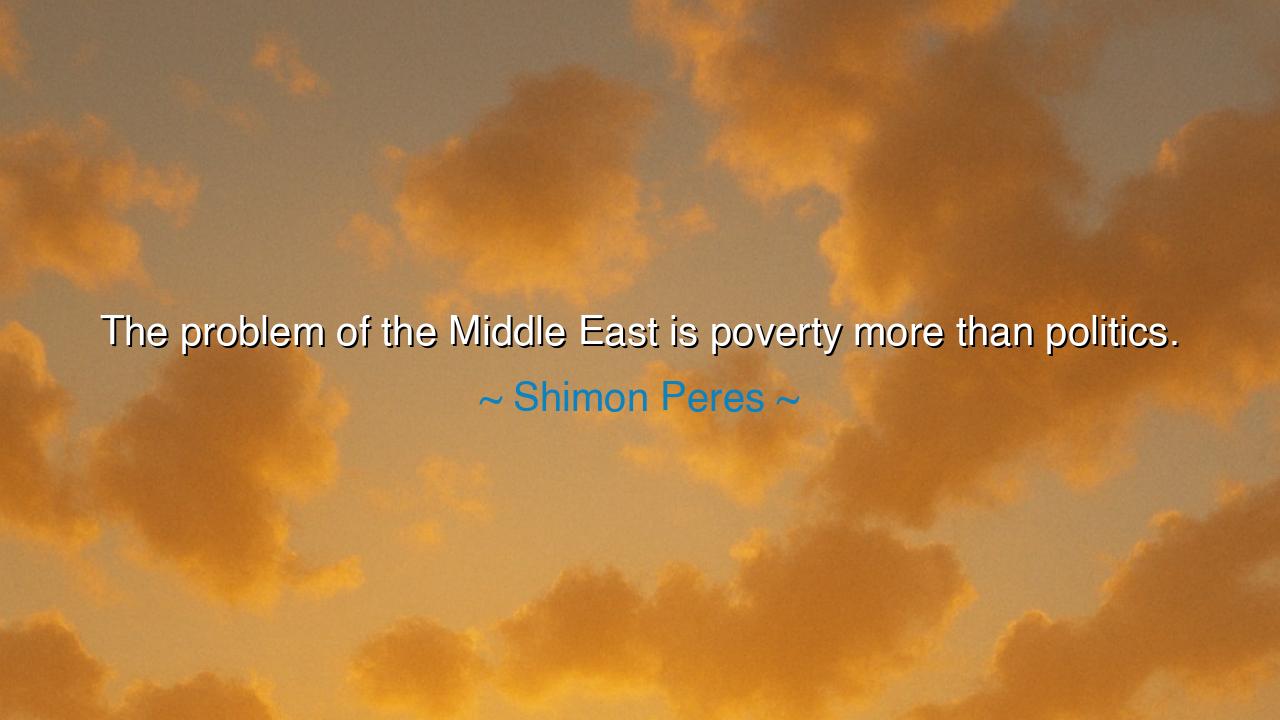
The problem of the Middle East is poverty more than politics.






Hear the words of Shimon Peres, a statesman who sought peace in a land long torn by strife: “The problem of the Middle East is poverty more than politics.” In these words lies a piercing truth—that beneath the quarrels of nations and the thunder of armies lies a deeper wound: the hunger of the people, the lack of bread, the thirst for dignity. For when the belly is empty, promises of peace are frail, and when the young have no future, war finds eager recruits.
The world often sees the Middle East through the lens of politics—alliances, disputes, borders, and battles. Yet Peres, who walked among leaders and dreamers, saw that the roots of unrest are often economic. Poverty breeds despair, and despair can be twisted into rage. A child who grows up without work, without schooling, without hope, is vulnerable not only to suffering but to those who would use that suffering as fuel for violence. Thus, the struggle is not only of ideology, but of survival.
Consider the rebuilding of Europe after the Second World War. The nations were weary, their cities in ruins, their people impoverished. If left to rot in hunger, the continent might have fallen again into chaos and tyranny. Yet through the Marshall Plan, food was given, factories rose, and hope returned. Peace was secured not only by treaties, but by full stomachs and steady labor. So too might the Middle East find a truer stability not through endless negotiations alone, but through lifting its people from poverty.
The wisdom of Peres is therefore not only diagnosis, but a call. To solve disputes with words while ignoring the cries of the poor is to build palaces on sand. Only when the people see that peace brings prosperity, that coexistence yields bread and opportunity, will reconciliation endure. For politics without sustenance is but a mask; true peace is built on justice, and justice demands the lifting of the oppressed.
Therefore, let this truth be remembered: the root of conflict is often deeper than the banners of armies or the speeches of leaders. It lies in the empty table, the shuttered school, the wasted field. Shimon Peres reminds us that to heal the Middle East, one must heal its poverty, for when the people flourish, the soil of war will grow barren. Only then may peace take root and blossom.






THVi Thi Hue
Peres’ statement feels a bit oversimplified. While poverty certainly contributes to instability in the Middle East, don’t political ideologies, territorial disputes, and religious conflicts hold just as much weight? Can economic aid and development solve the problems without changing the political landscape? Is it possible to tackle poverty in the region without dealing with the political structures that perpetuate it? This view seems to miss some of the deeper layers of the conflict.
TMTrang Mai
I see Shimon Peres’ point that poverty plays a significant role in the problems of the Middle East, but I’m not sure it’s the primary driver. Aren’t political and religious ideologies also significant factors? If poverty were alleviated, would the political struggles disappear, or would new challenges arise? This is a complex issue—can poverty truly be solved without addressing political structures and vice versa? There’s a lot more at play here than just poverty.
TTCu Tien Thanh
Peres’ view on the Middle East problem being more about poverty than politics challenges the way we often think about the region. But is it really poverty at the root of all these issues? Could the deep political divides, historical grievances, and power struggles be the driving force, with poverty only exacerbating them? How do we address both issues simultaneously to create long-lasting solutions? This makes me think about how interlinked economics and politics really are.
GSgojo satoru
Shimon Peres’ statement about poverty being a larger issue than politics in the Middle East is compelling. Could it be that many of the region's political conflicts are actually symptoms of deeper socioeconomic issues? If poverty were reduced, would the political tensions subside, or is the political instability in the region too deeply entrenched? It makes me wonder if focusing on economic development could lead to more sustainable peace in the Middle East.